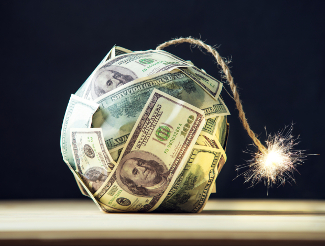With interest rates having been held at near-zero for nearly a decade, and in Europe and Japan actually being forced into negative territory, it shouldn’t be any surprise that debt issuance around the world has exploded. Total global debt levels are set to hit an all-time high of over $257 trillion. That’s more than triple the world’s entire economic output, and more than $33,000 for every person on the planet. How long can this last?
Debt in and of itself isn’t a bad thing, in fact it can be quite useful at times. But debt means borrowing from the future to pay for things in the present. It assumes that wealth and productivity will be greater in the future than they are today. But if the future doesn’t bring greater wealth and productivity, what happens? Debt is defaulted on, and a series of defaults ensues, as borrowers go bankrupt and lenders are forced to write down their loans, often going out of business themselves.
The amount of debt in the world today is an attempt at an enormous intergenerational wealth transfer, perhaps the largest in history. We have borrowed from succeeding generations in order to guarantee a comfortable life in the present, but the house of cards will eventually come falling down. It starts with households defaulting on their debts: mortgages, auto loans, credits cards, etc. Then businesses start to default, and go out of business. Eventually even governments will have to default on their debts, as debt to GDP ratios continue to grow, and national debts will never ever be paid off.
None of that is good news for investors, as bonds make up a significant portion of many investors’ portfolios. If you’re nearing retirement, there’s a good chance that at least 40% or more of your retirement savings consists of some sort of bonds. And in the event of a series of bond defaults, bond markets will freeze up and many bonds will lose significant value.
Investors who remain invested in both stocks and bonds risk a double whammy: a crashing stock market and plummeting bond values. With the bubble as large as it is right now, the next crash could be even worse than 2008. Have you taken steps to protect your assets yet?
How many investors look back to 2008 and wish they had invested in gold so that their investment portfolios would have been protected? Gold gained over 25% while stock markets lost over 50% of their value. That same scenario may repeat itself during the next market crash. If you haven’t started preparing to protect your retirement savings by investing in gold, what are you waiting for?
This article was originally posted on Goldco.



